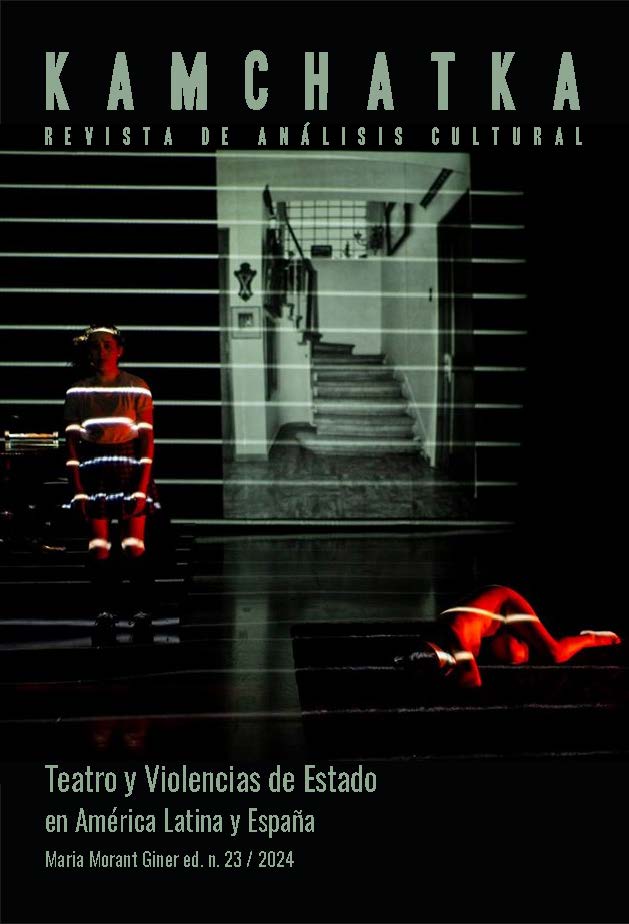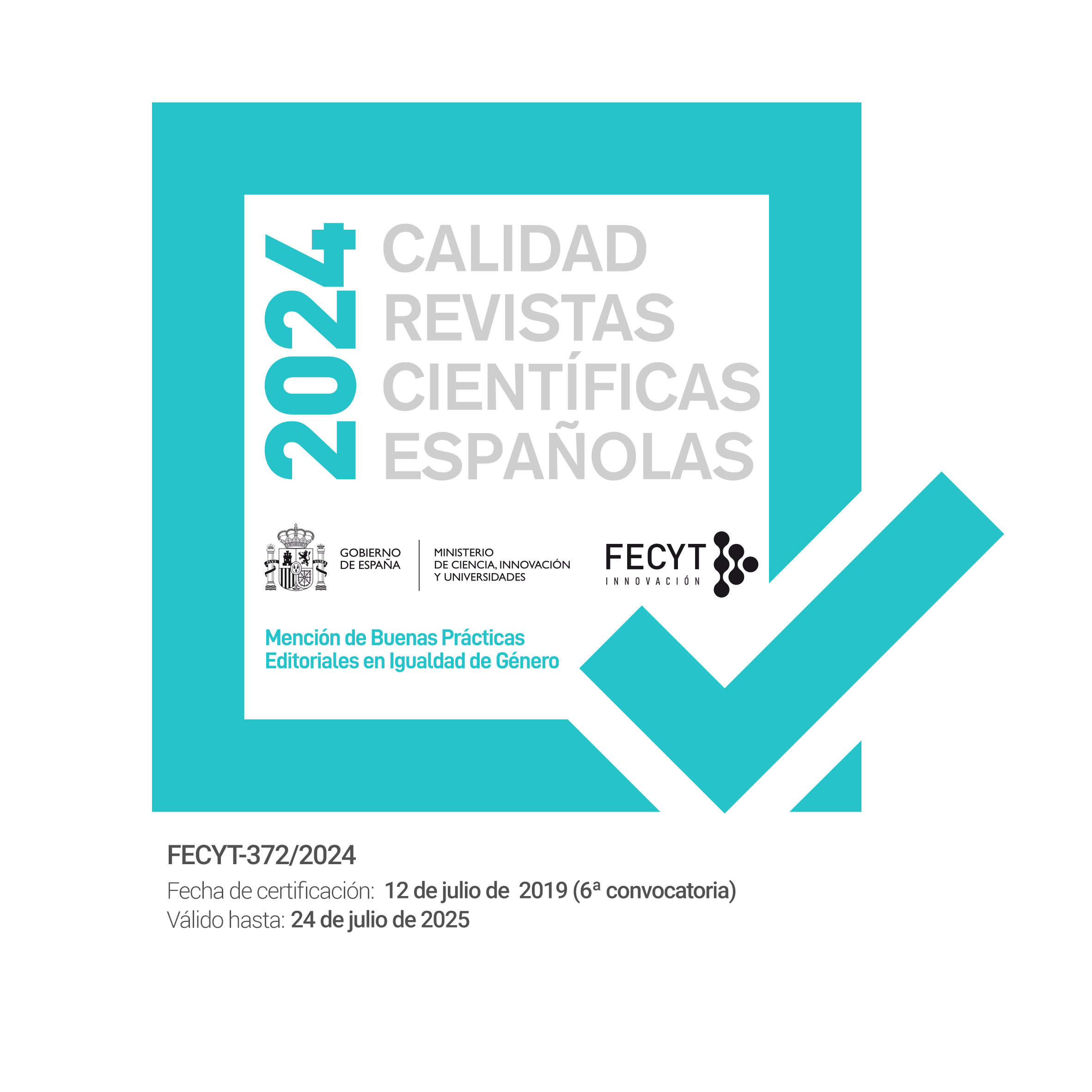Accessing Traumatic Pasts through Play: Children’s Perspectives in Two Chilean Theatre Pieces
DOI:
https://doi.org/10.7203/KAM.23.25594Palabras clave:
Chilean dictatorship, theatre, play, humor, second generation, postmemory Resumen
Resumen
This paper examines Lola Arias’ El año en que nací (2012), and Gemelos by Chile’s La Troppa (1999), two theatre works which both approach the telling of trauma and representing experiences of life during dictatorship through the eyes of children. In both works, affective experiences of the dictatorship (knowledge difficult to document and discern in the official narrative) are communicated to the viewing audience by incorporating game playing and lightening tactics such as humor. Through moments of engaging in play, the incorporation of toys, role-playing, humor and laughter, a lightened mood of confronting serious social problems is suggested. I conclude that a ludic representation of trauma and violence may be one of the primary ways that the second generation approaches this charged, difficult to access history while negotiating with and evaluating post-memories and their society’s collective memory.
 Descargas
Descargas
 Citas
Citas
Andermann, Jens. “Expanded Fields: Postdictatorship and the Landscape.” Journal of Latin American Cultural Studies: Travesia, 21:2, 165-187, 2012.
Arias, Lola. Mi vida después y otros textos. Reservoir Books, 2016.
Arias, Lola. Website. http://lolaarias.com/proyectos/el-ano-en-que-naci/
Brennan, Teresa. The Transmission of Affect. Cornell University Press, 2004.
Breton, André. Anthology of Black Humor. 1940. City Lights Publishers, 2001.
Caruth, Cathy. Unclaimed Experience: Trauma, Narrative, and History. John Hopkins University Press, 2016.
Castro, Isabel. “Radar L.A. Review: 'El Año en Que Nací' At The LATC.” 2013. http://www.neontommy.com/news/2013/09/radar-la-review-kicking-screaming-political-turmoil-and-humor.
Critchley, Simon. On Humour. Routledge, 2002.
De la Luz Hurtado, María. “Gemelos: un Prodigio de La Troppa.” Revista Apuntes, 116, 1999.
De Querol, Ricardo. “Los niños de la represión chilena llenan los silencios: Los jóvenes criados durante la dictadura de Pinochet ya son una destacada generación literaria. Comparten una reconstrucción de la memoria entre lo íntimo y lo político.” El país, July 13, 2015. http://cultura.elpais.com/cultura/2015/06/09/babelia/1433843677_532023.html
Echeverría, Estefanía. “Debuta El Año en que Nací, la obra sobre la historia personal de Chile bajo Pinochet.” La Tercera, January 20, 2012.
Eisen, George. Children and Play in the Holocaust: Games among the Shadows. University of Massachusetts Press, 1988.
El año en que nací/The year I was born. Play Program, 2014. https://mcachicago.org/Calendar/2014/01/Lola-Arias-The-Year-I-Was-Born
Gaudichaud, Franck. “Chile: 30 años después del golpe de Estado: Retrato de una memoria desgarrada.” Politis, Paris, September, 2003, Translated by Laura Abad for the journal Rebelión.
Glasgow, R. D. V. Madness, Masks, and Laughter: An Essay on Comedy. Associated University Presses, 1995.
Graham-Jones, Jean. “Lo real no siempre se rehace de la misma manera: Mi vida después y El año en que nací de Lola Arias.” Revista Apuntes de Teatro, Number 138, 2014.
Gutierrez, Melissa. “El año en que nací: la obra que investiga la vida de los padres durante la dictadura.” The Clinic, January, 2013. https://www.theclinic.cl/2013/01/16/el-ano-en-que-naci-la-obra-que-investiga-la-vida-de-los-padres-durante-la-dictadura/
Herman, Judith. Trauma and Recovery: The Aftermath of Violence- from Domestic Abuse to Political Terror. Basic Books, 2015.
Hernández, Paola. “Biografias escénicas: Mi vida después de Lola Arias.” Latin American Theatre Review, Fall 2011, 115-128.
Hirsch, Marianne. Family Frames: Photography, Narrative and Postmemory. Harvard University Press, 1997.
Hutcheson, Francis. Reflections Upon Laughter. The Dublin Journal, 1725.
J.L.F. “Gemelos, la obra más exitosa del teatro chileno reciente, regresa al Teatro Municipal de Las Condes.” La Tercera, November, 2012. http://www.latercera.com/noticia/cultura/2012/11/1453-493286-9-gemelos-la-obra-mas-exitosa-del-teatro-chileno-reciente-regresa-al-teatro.shtml
Jara, Daniela. “The aftermath of violence: The Post-coup second generation in Chile.” Peripheral Memories: Public and Private Forms of Experiencing and Narrating the Past, Bielefeld, Transcript, 2012.
Kaiser, Susana. Postmemories of Terror: A New Generation Copes with the Legacy of the "Dirty War". Palgrave Macmillan, 2005.
Kayser, Wolfgang. The Grotesque in Art and Literature. McGraw-Hill, 1966.
Kristof, Agota. Le grand cahier. Seuil, 1986.
La Troppa. Gemelos. 1999.
Larson, Catherine. Games and Play in the Theatre of Spanish American Women. Bucknell University Press, 2004.
“Laughter.” Radiolab, Season 4, episode 1, February, 2008. http://www.radiolab.org/story/91588-laughter/
Letelier, Jorge. “El punto de inflexión de Teatrocinema: “Nos sentimos más sueltos, más lúdicos, más risueños”.” El mostrador, January, 2015. http://www.elmostrador.cl/cultura/2015/01/24/el-punto-de-inflexion-de-teatrocinema-nos-sentimos-mas-sueltos-mas-ludicos-mas-risuenos/
Levey, Cara. “Documenting Diaspora, Diasporising Memory: Memory and Mediation among Chilean and Uruguayan Hijxs del exilio.” Bulletin of Latin American Research, December 2021, pp. 1-15.
Martin, Carol. Theatre of the Real. Palgrave, 2013.
Massumi, Brian. “The Autonomy of Affect.” Cultural Critique, no. 31, 1995, pp. 83–109.
McGraw, Peter. The Humor Code: A Global Search for What Makes Things Funny. Simon & Schuster, 2014.
McGraw, A.P. & Warren, C. “Benign violations: Making immoral behavior funny.” Psychological Science, 21, 2010, pp. 1141-1149.
“‘Mi Vida Después’: Cómo Enfrentar la Historia Familiar a Partir de los Recuerdos.” January 14, 2011. http://www.jhcnewmedia.org/stgoamil/?p=6499
Morreall, John, "Philosophy of Humor", The Stanford Encyclopedia of Philosophy, Spring 2013 Edition, Edward N. Zalta (ed.). http://plato.stanford.edu/archives/spr2013/entries/humor/
Oyarzún, Carola. “El talento creativo de La Troppa.” Taller de Letras, No. 37, 2005, pp. 193-199.
Patraka, Vivian M. “Spectacular Suffering: Performing Presence, Absence and Witness at the U.S. Holocaust Memorial Museum.” Performance and Cultural Politics, Routledge, 1996, pp. 89-107.
Ros, Ana. The Post-dictatorship Generation in Argentina, Chile, and Uruguay. Collective Memory and Cultural Production. Palgrave Macmillan, 2012.
Shapiro, Gary. “With Toy Theaters, Small Is Beautiful.” The New York Sun, June 14, 2005. http://www.nysun.com/on-the-town/with-toy-theaters-small-is-beautiful/15397/
Sontag, Susan. Regarding The Pain of Others. Picador, 2003.
Sosa, Cecilia. “Mi vida después: Non-Kin Affects in Post-Dictatorial Argentina.” http://hemisphericinstitute.org/hemi/en/e-misferica-72/sosa
Stern, Steve. Reckoning with Pinochet: The Memory Question in Democratic Chile, 1989-2006. Duke University Press, 2010.
Suleiman, Susan. “The 1.5 Generation: Thinking about Child Survivors and the Holocaust.” American Imago. 59, 2002, pp. 277-295.
Teatro a mil. Website. https://teatroamil.cl/catalogo-obras/el-ano-en-que-naci/
The National Child Traumatic Stress Network online. http://www.nctsn.org/trauma-types/complex-trauma/effects-of-complex-trauma
Thomson, Philip J. The Grotesque. Methuen, 1972.
Wandelt, Sonja Julia. The Translation from Memory to Postmemory: The Mother-Daughter Dialogue in Post-Holocaust Literature. University of Illinois at Urbana-Champaign, 2008, Doctoral Thesis.
Wilshire, Bruce. Role Playing and Identity: The Limits of Theatre as Metaphor. Indiana University Press, 1982.
Zambra, Alejandro. Formas De Volver a Casa. Anagrama, 2011.
Descargas
Publicado
Cómo citar
-
Resumen119
-
ARTÍCULO PDF 96
Número
Sección
Licencia
Derechos de autor 2024 Marin Laufenberg

Esta obra está bajo una licencia internacional Creative Commons Atribución-NoComercial 4.0.
Los textos publicados en esta revista están –si no se indica lo contrario– bajo una licencia Reconocimiento-NoComercial 4.0 de Creative Commons. Puede copiarlos, distribuirlos y comunicarlos públicamente siempre que cite su autor y el nombre de esta publicación, Kamchatka. Revista de análisis cultural y no los utilice para fines comerciales. La licencia completa se puede consultar en Creative Commons.
Aquellos autores/as que tengan publicaciones con esta revista, aceptan los términos siguientes:
- Los autores/as conservarán sus derechos de autor y garantizarán a la revista el derecho de primera publicación de su obra, el cuál estará simultáneamente sujeto a la Licencia de reconocimiento no comercial de Creative Commons que permite a terceros compartir la obra siempre que se indique su autor y su primera publicación esta revista.
- Los autores/as podrán adoptar otros acuerdos de licencia no exclusiva de distribución de la versión de la obra publicada (p. ej.: depositarla en un archivo telemático institucional o publicarla en un volumen monográfico) siempre que se indique la publicación inicial en esta revista.
- Se permite y recomienda a los autores/as difundir su obra a través de Internet (p. ej.: en archivos telemáticos institucionales o en su página web) antes y durante el proceso de envío, lo cual puede producir intercambios interesantes y aumentar las citas de la obra publicada.





